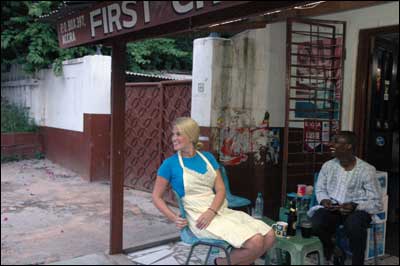
“You are invited to a mini party,” a man said as he poured a Malta Guinness into his glass. His laugh filled the afternoon shade. “Would you like to share a drink?”
I lifted my eyes from the Scrabble game. The words “hip,” “scare,” and “rum” dissolved from my thoughts as I carried my attention away from the board to the customer who had taken a seat with a newspaper.
It was my first day working in a neighborhood snack shack in Accra, the capital of Ghana, and I’d already been invited out. I found my job when the window of our passing van framed a tiny store called First Choice Enterprise, and a sign that read “Sales Girl Wanted.” As a study abroad student from New York City, I didn’t expect to have a job, but my plan suddenly changed when those bright white letters called out to me.
Accra’s streets are clogged with Ghanaians selling all kinds of tiny goods. Women carry tins of groundnuts, baskets of tomatoes, and bins of drinking water on their heads, as they weave in and out of traffic. Men yell, “Sunglasses, good price!” Coins pass from hands of buyer to seller through the windows of cars, taxis, and the minivans known as tro-tros. If those hands are lucky, they collect more than the average of $7.40 per day. Given that economic situation, and the high unemployment here, I decided to volunteer.
In the shack, business was quieter and more casual. We passed the mornings appreciating the goodness of each other’s company, interrupted occasionally by a sale.
All the noise and action of Ghana’s small commerce can be deceptive. Ghanaians know how to peddle a meat pie, but they also know how to just be. They know how to sit with their own thoughts, to laugh, to take the time to enjoy a biscuit, or to sip a malt with the passing of the afternoon sun. They do not rush, because they do not look at their day as a series of time slots to be filled with blocks of activity. There is always time to slow down for a friend, or share lunch with a passing stranger.
I was taken on by Auntie Mary and Uncle Felix, whose titles are a sign of respect. I, too, acquired a special Ghanaian name.
“My name is Adjua,” I would say when I shook a customer’s hand.
“Ah … you were born on a Monday!” was the usual reply. Children in Ghana are named after the day of the week on which they were born.
During my second week of work, I spent Sunday morning at church with Doris, the other salesgirl, whose friend translated the three-and-a-half hour service into English from Ga, one of several local languages.
“I would like to welcome you to the service this morning,” the pastor said to me in the middle of his sermon. Smiles, laughter, and a few stray claps filled the outdoor space.
That afternoon, Auntie Mary and her family invited me to the beach, where we sat for hours feeling the silky breeze brush off the waves of the Gulf of Guinea.
“I am going to take a picture of you carrying crates,” Auntie Mary’s brother said. “It is all I need in life.” He laughed. It seemed as though I was no longer the tourist.
The following evening, Doris took me to her home, where I met her four siblings and her mother, who sells tomatoes, pickled eggs, and yams at a local stand. Doris was earning less than the roughly $2-per-day minimum wage, a common situation here.
Doris’s youngest sister showed her friendship by putting her hand in mine as we walked along the dirt road, lit only by the kerosene lamps of merchants selling smoked fish and grilled corn. Welcoming me into their home, her family accepted me into their lives and showed me what it means to be Ghanaian. The next morning, as the hazy sun found its place in the African sky, Doris and I returned to work, and prepared baskets of biscuits and crates of Coke for customers who would stumble across the shack — maybe inviting us to another mini party.
- Follow us on Twitter: @inthefray
- Comment on stories or like us on Facebook
- Subscribe to our free email newsletter
- Send us your writing, photography, or artwork
- Republish our Creative Commons-licensed content

